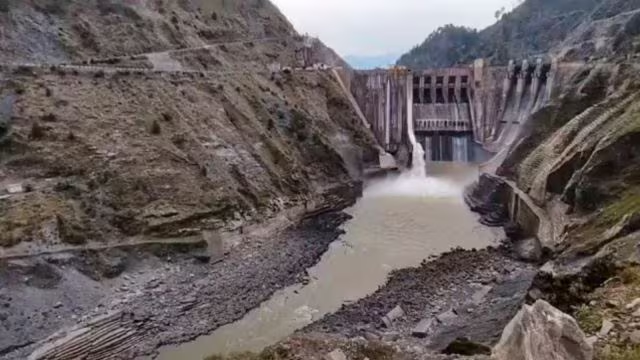India has firmly rejected the recent ruling issued by a so-called Court of Arbitration concerning the Kishenganga and Ratle hydroelectric projects located in Jammu and Kashmir. The ruling, referred to as a “supplemental award,” was delivered by a tribunal that India has consistently opposed since its formation.
“India has never recognised the existence in law of this so-called Court of Arbitration, and India’s position has all along been that the constitution of this so-called arbitral body is in itself a serious breach of the Indus Waters Treaty and consequently any proceedings before this forum and any award or decision taken by it are also for that reason illegal and per se void,” said an MEA statement.
In a statement, the Ministry of External Affairs (MEA) clarified that India has never accepted the legality or jurisdiction of this Court of Arbitration. It was constituted under the Indus Waters Treaty (1960)—a water-sharing agreement between India and Pakistan brokered by the World Bank. India argues that the formation of this specific court violates the Treaty’s dispute resolution framework and represents a serious procedural breach.
“India considers this tribunal and its proceedings entirely illegal. Any decision emerging from it has no legal standing,” the MEA declared.
Background: What is the Court of Arbitration under the Indus Waters Treaty?
The Indus Waters Treaty (IWT), signed in 1960 between India and Pakistan and brokered by the World Bank, outlines a three-tiered dispute resolution system. It distinguishes between questions, differences, and disputes:
-
Questions are resolved by the Permanent Indus Commission, which has representatives from both countries.
-
Differences are referred to a Neutral Expert, whose decision is binding and intended to resolve technical matters.
-
Disputes are taken to an ad hoc Court of Arbitration, constituted specifically for each case.
The Court of Arbitration, unlike a permanent court, is a temporary tribunal set up only when both parties agree that a full dispute needs arbitration. It operates by majority vote and includes arbitrators from both countries, plus neutral members. The World Bank’s role is procedural and limited to appointing neutral individuals if both countries request it.
Why India Calls This CoA ‘Illegal’:
In this case, India never agreed to the formation of the current Court of Arbitration.
India says Pakistan unilaterally pushed for arbitration while a neutral expert process was already ongoing.
This violates the treaty’s rules, according to India. Hence, it does not recognise the tribunal’s legitimacy or its rulings.
The recent award sought to address technical objections raised by Pakistan against India’s construction of hydroelectric projects on the western rivers allocated to Pakistan under the Treaty. However, India maintains that its projects fully comply with the Treaty’s terms and that any dispute should be handled through bilateral or neutral expert mechanisms, not arbitration.
Pakistan, in 2015, raised objections to the design of India’s Kishenganga and Ratle hydroelectric projects, located on the Kishenganga (a tributary of the Jhelum) and Chenab rivers, respectively. Initially, Pakistan sought resolution through a Neutral Expert via the World Bank. However, in 2016, it withdrew that request and instead sought arbitration through a Court of Arbitration.
On Thursday, the Court of Arbitration asserted that India’s stance of holding the treaty in abeyance
“does not deprive the Court of Arbitration of competence.”
This comment was made as part of its supplemental award in the case, despite India’s continued refusal to acknowledge the Court’s authority.
Treaty in Abeyance After Terror Attacks
The MEA also stated that India has put the Indus Waters Treaty in abeyance following the Pahalgam terror attack, citing Pakistan’s continued support for cross-border terrorism. As a result, India has declared that it is no longer bound by any obligations under the Treaty.
“No Court of Arbitration has the authority to question India’s sovereign decision in this matter,” the Ministry asserted.
India further criticized Pakistan for attempting to manipulate international legal platforms to divert attention from its record.
“This latest charade at Pakistan’s behest is another desperate attempt to escape accountability for being the global epicenter of terrorism,” the statement read.
This is not the first time India has expressed serious concerns over the Treaty. In January 2023, India issued its first-ever notice to Pakistan seeking a “modification” of the Indus Waters Treaty, a significant move in the Treaty’s six-decade history. The pressure increased in September 2024 when New Delhi issued another formal notice, this time seeking a “review and modification,” which experts interpret as a potential signal to revoke or renegotiate the 65-year-old pact. India officially placed the Treaty in abeyance after the April 2025 Pahalgam terror attack, where 26 people were killed and 10 injured, a move meant to hold Pakistan accountable for cross-border terrorism.








